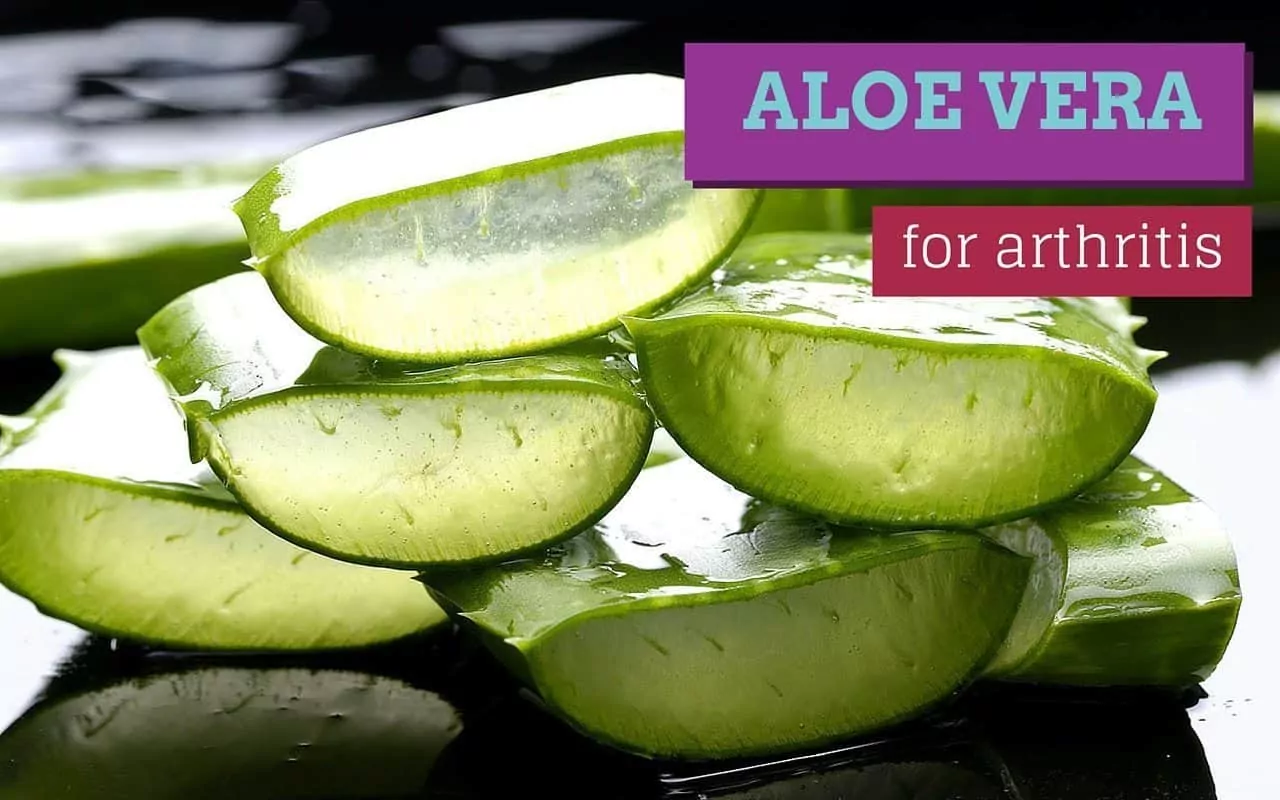
Aloe vera has long been praised for its numerous health benefits, and one of its lesser-known applications is as a natural remedy for arthritis treatment. The use of aloe vera, a succulent plant with thick, fleshy leaves containing a gel-like substance, has been a part of traditional medicine for centuries. As science delves deeper into its properties, it is increasingly evident that aloe vera can offer significant relief to people who suffer from arthritis-related joint pain and immobility.
The efficacy of aloe vera in reducing arthritis inflammation can be attributed to its unique composition which includes anti-inflammatory substances and immune system modulating properties. The plant’s action on the body’s autoimmune reaction can lead to reduced pain and increased mobility, making it a promising option for arthritis sufferers.
Additionally, aloe vera may have utility as a prophylactic against the gastrointestinal irritant effects of non-steroidal anti-inflammatory drugs (NSAIDs), making it a well-rounded choice for individuals seeking a more natural path towards pain relief and overall well-being.

Aloe vera is a well-known plant with numerous health benefits, particularly in treating skin conditions or minor wounds. In recent times, it has gained an increased focus for its potential in managing arthritis and reducing inflammation in affected joints.
There are two main types of arthritis: osteoarthritis and rheumatoid arthritis. Osteoarthritis affects the cartilage in the joints and usually results from wear and tear over time, while rheumatoid arthritis is an autoimmune disease causing inflammation and stiffness in the joints mostly in winter season. Both types can cause significant pain and discomfort, negatively affecting a person’s quality of life.
A study published in 1994 established that aloe vera helps reduce the inflammation in arthritis-affected joints, supporting the body’s natural autoimmune response. Consequently, this inexpensive, natural remedy can potentially decrease pain and increase mobility in patients.
Aloe vera gel, extracted directly from the plant, can be applied topically onto the joints, massaged gently for a few minutes, and left on for some time. This process can be repeated three times a day for maximum benefit. Additionally, aloe vera juice can be consumed orally as a supplement for further pain relief, usually consumed 30 minutes before breakfast, lunch, and bedtime.
Although aloe vera for arthritis management and pain relief offers a promising option, it is always advised to consult with a healthcare professional before starting any new treatment. Keep in mind that the severity and symptoms of arthritis can vary from person to person, and what works for one may not work for another. However, exploring the benefits of aloe vera for arthritis can be an important step for individuals seeking alternative or complementary treatments to manage their condition.
Aloe vera has been traditionally used in alternative medicine for various ailments, including arthritis. The science behind its effectiveness in treating arthritis lies in its biochemical properties. Research has shown that aloe vera possesses anti-inflammatory effects that could help reduce inflammation, swelling, redness, and stiffness in arthritis-affected joints.
One study published in 1994 established that aloe vera supports the body’s autoimmune reaction, which could reduce pain and immobility in arthritis patients. The immunomodulatory property and mannose-6-phosphate content of aloe vera help to inhibit inflammation, promoting quick healing of tissues. Additionally, aloe vera contains anthraquinones that contribute to the relief of joint and knee pain.
There is also scientific evidence that suggests aloe vera could be useful as a treatment for osteoarthritis. The benefits of prescribing aloe vera for osteoarthritis include its dual-purpose utility as an anti-inflammatory agent and prophylactic against the gastrointestinal irritant effects of non-steroidal anti-inflammatory drugs (NSAIDs).
In summary, the science behind aloe vera’s effectiveness for arthritis stems from its anti-inflammatory properties and its ability to support the body’s autoimmune reaction. These factors contribute to reducing inflammation, swelling, redness, and stiffness in arthritis-affected joints, providing relief to those who suffer from this condition.

Aloe vera can be effective in managing arthritis inflammation and providing various health benefits. There are several ways to use aloe vera for this purpose. It is essential to choose a suitable application method based on your preferences and needs.
One widely used method is applying aloe vera topically. Aloe vera gel can be directly extracted from the plant and applied to the affected joints. Gently massage the gel for a few minutes, then leave it on for a while before rinsing. This process can be repeated three times daily to obtain maximum relief from joint pain. Alternatively, aloe vera creams are available in the market to provide similar benefits.
Another popular approach is consuming aloe vera orally. Aloe vera is available in various forms such as capsules, powders, and pills. Consuming aloe vera in these forms can have anti-inflammatory effects without causing gastrointestinal irritation, which is often a side effect of non-steroidal anti-inflammatory drugs (NSAIDs). Drink aloe vera juice or consume aloe vera gel about 30 minutes before breakfast and lunch, and once again before bedtime for optimal results.
It’s important to use aloe vera responsibly and carefully monitor any reactions your body may have. Although aloe vera is generally considered safe for most people, it is crucial to consult a healthcare professional before incorporating it into your arthritis treatment regimen.
By applying aloe vera topically or consuming it orally, you can harness its anti-inflammatory properties and health benefits to manage arthritis inflammation effectively. Just remember to choose a suitable application method based on your preferences and needs, and always consult your healthcare professional.
Aloe vera has been long known for its incredible health benefits. This succulent plant is packed with various essential nutrients such as vitamin C, minerals, proteins, and antioxidants, making it a popular ingredient in various wellness products.
One of the primary benefits of aloe vera comes from its rich antioxidant content. Antioxidants play an essential role in neutralizing free radicals, which can cause oxidative stress and damage to our body’s cells. By including aloe vera into our daily routine, we can promote overall health by supporting our body’s natural defenses against harmful substances.
Calcium, iron, and zinc are essential minerals found in aloe vera that contribute to additional health benefits. These minerals are crucial for the development and maintenance of strong bones, optimal muscle function, and proper immune system function. By incorporating aloe vera into our diet or skincare routine, we can ensure our bodies are getting the proper nourishment it needs to fight against potential illnesses.
Aloe vera’s vitamin content is another significant source of its wonderful health benefits. Vitamins A, C, and E are found naturally in aloe vera, contributing to numerous health benefits such as supporting vision, boosting the immune system, and maintaining healthy skin. Other essential vitamins, such as B-vitamins, can be found in aloe vera, which aid in the regulation of metabolism, energy production, and nervous system functions.
The presence of proteins in aloe vera also adds to its health benefits. These proteins contribute to various bodily functions, including building and maintaining healthy muscle tissue, supporting immune system function, and regulating hormone production. This ensures that our bodies can operate at peak performance and maintain overall health.
Enriching our diet with aloe vera can result in a moderate amount of healthy fat. Including healthy fat in our routine can assist in maintaining balanced hormone levels, supporting brain function, and promoting cardiovascular health.

Aloe vera has long been recognized for its potential benefits to an array of skin conditions. Due to its soothing and anti-inflammatory properties, it may help alleviate symptoms of various skin issues, including psoriasis, acne, burns, and sunburns.
For individuals with psoriasis, aloe extract cream may help to reduce redness, scaling, itching, and inflammation. However, it is important to note that treatment should be consistent, and the cream should be applied several times a day for a month or more to see improvements. Moreover, aloe vera is believed to have antimicrobial capabilities, which can aid in preventing infections from developing in acne-prone skin.
Burns and sunburns are common skin issues that may benefit from the application of aloe vera gel. The cooling effect of aloe vera can provide immediate relief to burnt skin. Furthermore, the anti-inflammatory properties of aloe vera may help to reduce redness and swelling.
Applying aloe vera topically not only helps to soothe the skin but also promotes quicker healing of the skin. The anthraquinones found in aloe vera may help to reduce joint and knee pain caused by arthritis-related inflammation. In some cases, even oral consumption of aloe vera has been deemed effective for promoting overall health and combating inflammation in the body.
In conclusion, aloe vera can be a valuable addition to one’s skincare and overall wellness routine. Its versatile nature enables it to address various skin conditions effectively, making it a popular choice for individuals looking to improve their skin health and provide relief to arthritic joints.
Aloe vera is widely known for its various health benefits and its ability to reduce inflammation in arthritis patients. However, it is crucial to be aware of the potential side effects and safety concerns related to aloe vera use. Although it is generally considered safe when used topically, some individuals might experience skin irritations or an allergic reaction. People with sensitive skin should perform a patch test before applying aloe vera on a larger area.
When ingested, aloe vera can cause several side effects. Consuming aloe vera products, especially those containing aloe latex, can result in abdominal cramps, diarrhea, and electrolyte imbalances due to its laxative properties. Prolonged use of aloe latex as a laxative might lead to dependence and potential complications, such as dehydration and impaired colon function. Therefore, it is crucial to use aloe products that are free of aloe latex if you plan to consume them internally.
Pregnant and breastfeeding women should avoid consuming aloe vera, as the latex can cause uterine contractions and decrease milk production. Moreover, individuals with diabetes should exercise caution when ingesting aloe vera, as it might lower blood sugar levels.
It is essential to use aloe vera products with caution, especially when ingesting them. Always consult with a healthcare professional before adding aloe vera supplements or juice to your diet, especially if you have a pre-existing medical condition or are taking medications. By being aware of the potential side effects and using aloe vera safely, individuals can still benefit from its various health properties while minimizing potential risks.

Aloe Vera, a succulent plant, has been used medicinally for centuries, particularly for its anti-inflammatory properties. While already acknowledged for its potential benefits in treating arthritis, Aloe Vera has demonstrated promising effects for other health conditions as well.
It has been reported that Aloe Vera may provide relief for people with diabetes by stabilizing blood sugar levels and improving insulin sensitivity. However, further research is needed to establish the effectiveness and safety of Aloe Vera for diabetes management.
Aloe Vera’s potential cancer-fighting properties have also been explored, but the findings remain inconclusive. Some studies have shown that certain compounds in Aloe Vera, such as acemannan and aloin, may exhibit anti-tumor effects. However, due to the limited and conflicting data, no definitive conclusions can be drawn about Aloe Vera’s efficacy in cancer treatment.
In addition to these conditions, Aloe Vera has been used to alleviate constipation. The plant’s latex, found just under the leaf skin, contains compounds called anthraquinones that promote bowel movement. However, it is crucial to note that the long-term use of Aloe Vera for constipation may lead to harmful side effects, dependency, and electrolyte imbalance.
Individuals with ulcerative colitis may also find Aloe Vera’s anti-inflammatory properties beneficial. The plant’s gel has been shown to help reduce the inflammation and pain associated with this inflammatory bowel disease. Some studies suggest that Aloe Vera gel, taken orally, may improve symptoms and promote remission in patients with ulcerative colitis.
Aloe Vera is known to support the immune system, thanks to its immunomodulatory property and mannose-6-phosphate content which help inhibit inflammation. The plant may protect the body from chronic inflammation and infection by promoting a balanced autoimmune response. This multifaceted succulent has the potential to be a valuable addition to one’s health regimen for various conditions.
Aloe vera is a versatile plant known for its many health benefits, especially when it comes to reducing inflammation and pain associated with arthritis. Including aloe vera in one’s daily routine can complement various aspects of a healthy lifestyle, such as exercise, proper posture, regular physical movement, and nutrition.
For individuals with arthritis, regular exercise is crucial for maintaining mobility and flexibility. Physical activities such as standing and walking can significantly improve joint health. Incorporating aloe vera into the diet may help in quick healing of tissues and provide relief from joint pain while engaging in these activities. Its immunomodulatory properties and mannose-6-phosphate content work together to inhibit inflammation.
Practicing proper posture, such as standing and walking with correct alignment, can also help alleviate arthritis symptoms. Aloe vera, when used topically, may further enhance the benefits of proper posture by providing temporary relief from localized pain and discomfort.
When it comes to nutrition, adding aloe vera to one’s diet can have positive effects on overall health. Many substances present in aloe vera are known for reducing inflammation, not just in joints but other areas of the body as well, such as inflammatory bowel disease. Consuming aloe vera juice or gel may also relieve heartburn, a common condition experienced by many people.
Physical movement, like walking, supports overall wellbeing, including arthritis management. Pairing aloe vera with regular movement may provide additional pain relief, making it a valuable component of an arthritis-friendly lifestyle.
In conclusion, aloe vera plays a significant role in arthritis management when integrated into various aspects of a healthy lifestyle. It complements exercise, proper posture, regular movement, and nutrition, acting as a valuable aid in reducing arthritis-associated pain and inflammation.

Aloe vera, a versatile plant known for its anti-inflammatory and soothing properties, is often considered for managing arthritis-related inflammation. However, it’s important to understand how aloe vera may interact with common medications before incorporating it into your treatment plan.
One potential interaction involves nonsteroidal anti-inflammatory drugs (NSAIDs). Many people with arthritis use NSAIDs to manage their pain and inflammation. Aloe vera’s natural anti-inflammatory properties may enhance the effects of NSAIDs. This could increase the risk of adverse effects, such as gastrointestinal issues, bleeding, and ulcers. It’s beneficial to consult your healthcare provider before using aloe vera alongside NSAIDs to ensure safe consumption.
Another critical interaction to consider is with digoxin, a medication prescribed for heart conditions. Studies have shown that the laxative properties of aloe latex, a distinct substance from the clear aloe vera gel, can lead to decreased potassium levels in the body. Low potassium levels can, in turn, increase the risk of side effects from digoxin. To avoid complications, it is crucial to exercise caution when using aloe vera products, especially the aloe latex, while on digoxin.
Moreover, it’s essential to keep in mind that the interaction between aloe vera and different medications might vary, leading to either enhanced or diminished effects of the medications. To err on the side of caution and to ensure the best management of arthritis inflammation and overall health, consult your healthcare provider before integrating aloe vera into your routine.
By understanding the potential interactions between aloe vera and common medications, individuals with arthritis can make informed decisions about incorporating this natural remedy into their treatment plans. Always seek professional advice to find the optimal approach that safely and effectively addresses your unique health needs.
Before incorporating aloe vera into a daily regimen to alleviate arthritis inflammation and to support overall health, it is strongly recommended that individuals consult with their doctor or a healthcare professional. This is essential because a healthcare expert possesses the necessary knowledge and experience to assess each individual’s condition and determine whether aloe vera will provide the desired benefits without causing any adverse effects.
For example, some people may have an allergy to aloe vera or may experience undesirable side effects when consuming or applying it topically. Consulting with a healthcare professional ensures that individuals are informed about the safest and most effective ways to use aloe vera.
Additionally, a healthcare professional may provide suggestions on complementary treatments for arthritis inflammation, along with aloe vera. By discussing all available options, individuals will be better equipped to manage their condition and maintain their overall well-being.
In summary, speaking with a healthcare professional offers several advantages, including receiving individualized recommendations, understanding potential risks, and gaining clarity on the best ways to use aloe vera for arthritis inflammation and health benefits.

Aloe vera is a versatile plant known for its various health benefits, including its effectiveness in reducing arthritis inflammation. It’s available in several forms, allowing you to choose the one that best suits your needs and preferences.
Aloe vera juice is often consumed to alleviate joint pain and inflammation. To prepare the juice, simply mix the aloe vera gel with water or other juices, and consume once or twice daily. It’s important to choose a juice with a high percentage of aloe vera, ideally from 95% to 99%, to ensure maximum benefits.
Supplements in the form of pills or capsules are another popular option for consuming aloe vera. These are typically taken to improve overall joint health and provide a convenient way to incorporate aloe vera into your daily routine. For best results, follow the recommended dosage instructions provided on the supplement packaging.
Aloe vera tea is a soothing and warm way to enjoy the benefits of aloe vera. To make the tea, steep aloe vera gel, dried aloe leaves, or aloe vera powder in hot water, then strain and enjoy. Drinking this tea may provide relief from arthritis pain and inflammation.
Incorporating aloe vera into smoothies is a delicious method of reaping its benefits. Simply blend the aloe vera gel with your choice of fruit, vegetables, and liquid, creating a nutritious and refreshing drink. Consuming aloe vera smoothies may help reduce inflammation associated with arthritis.
When using aloe vera in any form, it’s important to start with a small dosage and monitor your body’s reaction to it. A suggested starting point could be 50 to 100 mg of aloe vera per day. However, it’s always best to consult with a healthcare professional before incorporating aloe vera into your arthritis treatment plan.
Aloe barbadensis, commonly known as Aloe vera, is a plant that is traditionally used in various cultures for its medicinal properties. In recent years, researchers have been investigating the potential benefits of Aloe vera in the treatment of arthritis and inflammation.
One study found that; Aloe vera may have utility as an anti-inflammatory agent for osteoarthritis, providing relief from inflammation and pain. Furthermore, due to its anti-inflammatory properties, Aloe vera could potentially serve as a prophylactic against the gastrointestinal irritant. Effects of non-steroidal anti-inflammatory drugs (NSAIDs) often prescribed for arthritis.
In a study conducted on rats, the oral administration of Aloe vera was shown to exhibit significant anti-arthritic activity. This research supports the idea that Aloe vera may be a promising alternative treatment option for those suffering from arthritis, providing pain relief and reducing inflammation.
There are various methods of using Aloe vera for arthritis treatment. One such method is by extracting the fresh gel from the Aloe plant and applying it directly to the joints. Massaging the gel gently into the affected area for a few minutes can help reduce pain and inflammation. For optimal results, you can repeat this three times a day. Another option is to consume pure Aloe vera gel before meals and bedtime to help alleviate arthritis symptoms from within.
Apart from the potential arthritis-related benefits, Aloe vera is used extensively in the treatment of skin injuries such as burns, cuts, insect bites, and eczemas, as well as digestive system problems. Its anti-inflammatory, antimicrobial, and wound healing properties make it a valuable resource for various health issues beyond arthritis.
In summary, research on Aloe vera and its potential benefits for arthritis and inflammation has shown promising results, with studies indicating it may provide relief from pain and inflammation while potentially reducing the side effects of NSAIDs.
Further research is needed to fully understand the extent to which Aloe vera can improve the lives of those living with arthritis, but it is clear that this natural remedy has a multitude of applications for promoting health and well-being.

Aloe Vera has been widely used as a natural remedy due to its numerous health benefits, including its effectiveness in treating arthritis inflammation. Additionally, there are other herbs and natural remedies that offer similar benefits and can be used in conjunction with Aloe Vera for enhanced results.
One such herb is ginger, which has anti-inflammatory properties that can help reduce joint pain and inflammation. It can be consumed in various forms, such as raw, in tea, or as an extract. Ginger tea has a long history of use in traditional medicine for addressing several health issues, including arthritis.
Curcumin, the active component in turmeric, is another powerful anti-inflammatory agent that can help reduce inflammation and relieve the pain associated with arthritis. Incorporating turmeric into one’s diet or taking curcumin supplements may provide relief to those suffering from joint pain and inflammation.
In addition to these individual herbs, there are also multi-ingredient natural remedies that combine their beneficial properties. For instance, combining essential oil like ginger, turmeric, and borage oil can create a powerful anti-inflammatory mixture that targets arthritis pain from different angles. Borage oil, derived from the seeds of the Borago officinalis plant, is a rich source of essential omega-6 fatty acids that can provide relief for people with rheumatoid arthritis.
It’s essential for those looking for alternative methods to manage their arthritis symptoms to approach these natural remedies with caution and research. Always consult with a healthcare professional before incorporating herbs or supplements into one’s treatment plan. When used in combination with traditional medical treatments, these complementary natural remedies can provide relief and improved quality of life for those suffering from arthritis inflammation.
Get more information on our pain relief products!
Aloe vera is anti-inflammatory properties that may help reduce joint inflammation associated with arthritis. Its natural steroids, such as salicylate and bradykinin, help decrease inflammation and soothe pain.
Aloe vera supports the body’s immune response, which may alleviate arthritis pain and immobility. By reducing inflammation, aloe vera can help lessen discomfort and improve joint flexibility .
Aloe vera contains various compounds, such as salicylate, bradykinin, and other natural steroids, which exhibit anti-inflammatory properties. Additionally, aloe vera is rich in essential vitamins, such as A, B, C, and E, which further enhance its effectiveness in reducing inflammation.
Applying aloe vera gel directly onto the affected joints can provide localized relief from arthritis pain. Alternatively, consuming aloe vera juice may also help reduce inflammation within the body and provide broader relief.
Herbal alternatives to aloe vera for arthritis relief include ginger, turmeric, and green tea. These herbs also possess anti-inflammatory and antioxidant properties, which can help alleviate joint pain and inflammation.
Aloe vera offers similar benefits to other natural remedies for arthritis, but its effects may vary from person to person. Factors such as individual response to treatment, severity of arthritis, and method of administration can impact the effectiveness of aloe vera compared to other natural remedies. It is essential to consult with a healthcare professional before incorporating any treatment into your arthritis management plan.